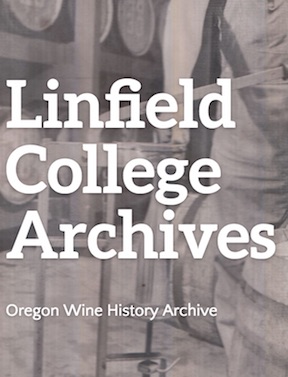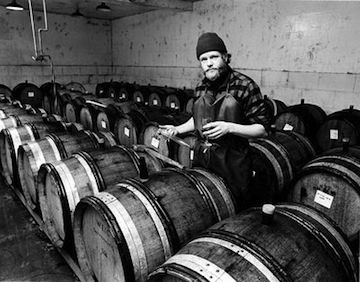The Primary Source of Oregon Wine History
 When I got a Bachelor’s degree in History at Humboldt State University in the late 1980s it was fun work. But at the undergraduate level, you just don’t do much real history. You learn about history and in some cases take a shot at doing history.
When I got a Bachelor’s degree in History at Humboldt State University in the late 1980s it was fun work. But at the undergraduate level, you just don’t do much real history. You learn about history and in some cases take a shot at doing history.
The Master’s Degree at San Francisco State University was different. This is when you start examining and using primary source documents: diaries, photos, government documents, memoirs, etc. One doesn’t DO history with anything but primary source documents.
This fact is what’s exciting about the Oregon Wine History Archive, recently spotlighted by SevenFifty Daily.
The Oregon Wine History Archive is an attempt to catalog that wine industry’s history by collecting artifacts of the industry going back to its beginning as well as actively creating primary source documents by undertaking oral history interviews with a number of people of note in the industry. The Archive is only a few years old and is housed at Linfield College in McMinnville in the Willamette Valley. Linfield College is becoming an important source of support to the Oregon Wine industry and recently received a $6 million dollar gift from Grace and Ken Evenstad of Domaine Serene to establish an interdisciplinary bachelor’s degree in wine studies.
There isn’t much profit in History or doing history; little monetary profit, that is. In order to commit to something like the Oregon Wine History Archive, you must be able to take the long view and possess a philanthropic disposition. One thing about the Oregon wine industry that has become a calling card is its members’ willingness to collaborate. That shows in this Archive.
to something like the Oregon Wine History Archive, you must be able to take the long view and possess a philanthropic disposition. One thing about the Oregon wine industry that has become a calling card is its members’ willingness to collaborate. That shows in this Archive.
This archive will really start to show its benefit when it begins to be useful to scholars who work to document various aspects of the Oregon wine industry. A historical archive is of no value if it merely sits in a climate controlled room and attracts no curious minds.
Another benefit of an archive like this is that it delivers prestige to a region (or state). It signals that the industry takes itself so seriously that it understands the need and benefits of keeping a record of how an industry developed and arrived at its current state.
One thing you learn when you start to study the primary sources of history is that there are always fascinating and surprising stories to be told that have yet to come to the surface. Finding and uncovering these stories is the exciting thing about delving into interviews, tax receipts, government documents, old reports, and family histories. Based on the kind of items that are being collected in the Oregon Wine History Archive it’s likely that future historians are going to owe a great debt to the folks who had the foresight and energy to found and expand this remarkable new resource.

Leave a Reply